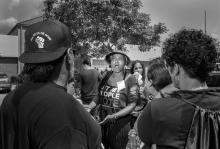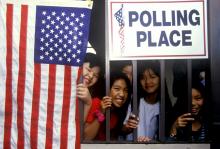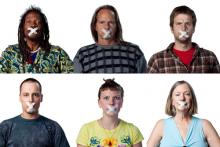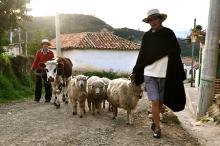disenfranchisement

LAST FALL'S MIDTERM elections brought the country’s single biggest expansion of the right to vote since the 26th Amendment lowered the voting age to 18.
Florida voters passed Amendment 4, a change to the Florida Constitution that automatically restores voting rights to 1.4 million Americans who have been living and working in our communities but politically disenfranchised because of criminal convictions in their past.
Before this amendment, Florida’s policy was extra strict—one of permanent disenfranchisement for all felonies, meaning that it did not matter what you did, how long ago it was, or how old you were when you did it. If you had a felony conviction, you could not get your right to vote back unless the government decided to specifically grant you clemency. That meant that even people who had long ago completed probation and parole were still unable to vote.
This outcome in Florida is to be celebrated, for several reasons. Amendment 4 promotes full citizenship and permits more people to participate in the electoral proc-ess. It ends a blatant Jim Crow policy. It encourages successful reintegration into the community. But it also brings core Christian teachings into the public square—and it is important that we discuss these teachings because there is still work to be done.
Disenfranchisement of those convicted of felonies is still widespread, if not the norm. The clearest exceptions are Maine and Vermont, where persons never lose their voting rights, even while they are incarcerated. In two states—Iowa and Kentucky—any felony conviction results in permanent disenfranchisement unless the government specifically restores an individual’s rights, similar to the approach Florida just changed. Some states permanently disenfranchise certain citizens, depending on the felony conviction. A number of states—18, in fact—disenfranchise returning citizens until all terms of their sentences have been completed, which can end up being years after they have returned to the community.
What are we getting out of disenfranchising people the criminal justice system has determined are appropriate to be living and working alongside us? What does scripture advise?

Outside of his role in our family, my grandfather played three roles in life that were dear to him: die-hard Mets fan, deacon in his church, never-miss-an-election voter. He was so unbelievably clear in his intention about voting, and perfectly committed to voting. He made that connection between faith and action.
And in his way, he lived out something I think about all the time: how to make our presence in the world powerful enough to change it.

The journey to end systems of injustice begins with a single step. This theme resonates throughout the recently released film Selma, which recounts the events leading up to the famous Selma-to-Montgomery march. Led by Dr. Martin Luther King Jr., this march catalyzed the full enfranchisement of people of color through the Voting Rights Act of 1965.
The Voting Rights Act is considered to be one of the most successful achievements of the civil rights movement. But 50 years later, the residue of Jim Crow laws that banned people of color from voting lingers today in a new, subtle form: disenfranchisement laws for people with felony convictions.
Michelle Alexander’s book, The New Jim Crow, examines how these laws strip minority communities of their voice in the public sphere because of the disproportionately high percentage of racial minorities “swept into” America’s mass incarceration system.

Of all the ugliness in Election 2012, nothing is more disturbing than attempts to prevent people from voting. Voter suppression strikes at the very heart of American democracy.
The flood of money into this year's campaigns has been bad enough, as wealth has sought to do what wealth usually seeks to do: gain control and preference.
The shouting of lies – not just shading the truth, but outright lies – has cheapened the liars and insulted the public.
Demagogic attacks grounded in religion, phony patriotism and race have undermined public trust in all politicians. It will take years to dig out from under the rot of such scorched-earth tactics.
But denying the basic right of citizenship to millions of voters is an offense we should all be protesting. For if the powerful can deny the vote to their opponents – especially the poor and people of color – they can deny the vote to anyone.

I’m Catholic. My father comes from a working class Irish Catholic family; my mom is from a large Catholic family of German and Lithuanian decent. My brothers, sister, and I all attended Catholic school and growing up we attended Friday fish fries during Lent and church polka fests in the summer. I’m an active member of a Catholic church in St. Paul. And soon, my wife and I will celebrate the baptism of our daughter into the Catholic Church.
I’m also voting no on the anti-marriage and voter restriction amendments.
Some have asked how I can embrace a faith whose leadership has taken such a hard line against gay and lesbian equality, and which is painfully quiet on the threat to limit voting rights. I understand why people ask this question. For me, my decision to vote no is not in spite of my Catholic faith, it’s because of it.
When I was 10 my parents divorced. A couple years later my mom came out to my family as lesbian. By then she no longer felt welcome at church and stopped going to mass, though she has remained a deeply spiritual person. This one case of social exclusion is deeply meaningful to me, but is nothing compared to political decision by church leadership to spend millions of dollars to limit the freedom to marry in Minnesota. By doing so church leaders seek to permanently exclude gays and lesbians from the civil rights and benefits straight couples enjoy.
But here’s the thing: I’m still getting my daughter baptized. And I’m still Catholic. And I’m still voting no on both amendments in November.
Heads up, students!
Under the guise of taking steps to protect against “voter fraud,” some lawmakers may be making it more difficult for you to vote.
If you’re a young person with a transient living situation, and especially if you’re an out-of-state college student who wishes to vote in the state where you attend school, it’s time to start paying close attention to your state’s election requirements and laws.
Efforts are already underway across the country to make it more difficult to vote, and if you’re not prepared, you may find yourself without an electoral voice come next November.
Approximately 37 states either have or are in the process of changing eligibility requirements for the 2012 election, and a recent report from the New York University School of Law’s Brennan Center predicts that they could affect up to 5 million voters from traditionally Democratic districts, affecting as many as 171 electoral votes.

Colombia's campesinos ("people of the land") — peasants, farmers and artisanal miners, the indigenous — are calling out for an end to the exploitation and environmental destruction of their lifelong territories and homes.
They call out for a restoration of their livelihoods. Greed and violence punishing their land is also visited upon the campesinos themselves, leaving them dead, disappeared or disenfranchised as one of the world's largest internally displaced people groups.
The campesinos of Colombia have come together and called out.
Will we listen?
Will we locate our own story in theirs?
Will justice be done? Are we willing to work for it?
Occupy Wall Sreet, false idols and a moral economy. Breaking the cycle of poverty. Poorest poor in U.S. hits a new record: 1 in 15 people. As poverty deepens, giving to the poor declines. Arianna Huffington: Shakespeare, the Bible and America's shift into a punitive society. Peaceful Occupy Oakland march followed by late-night clashes.